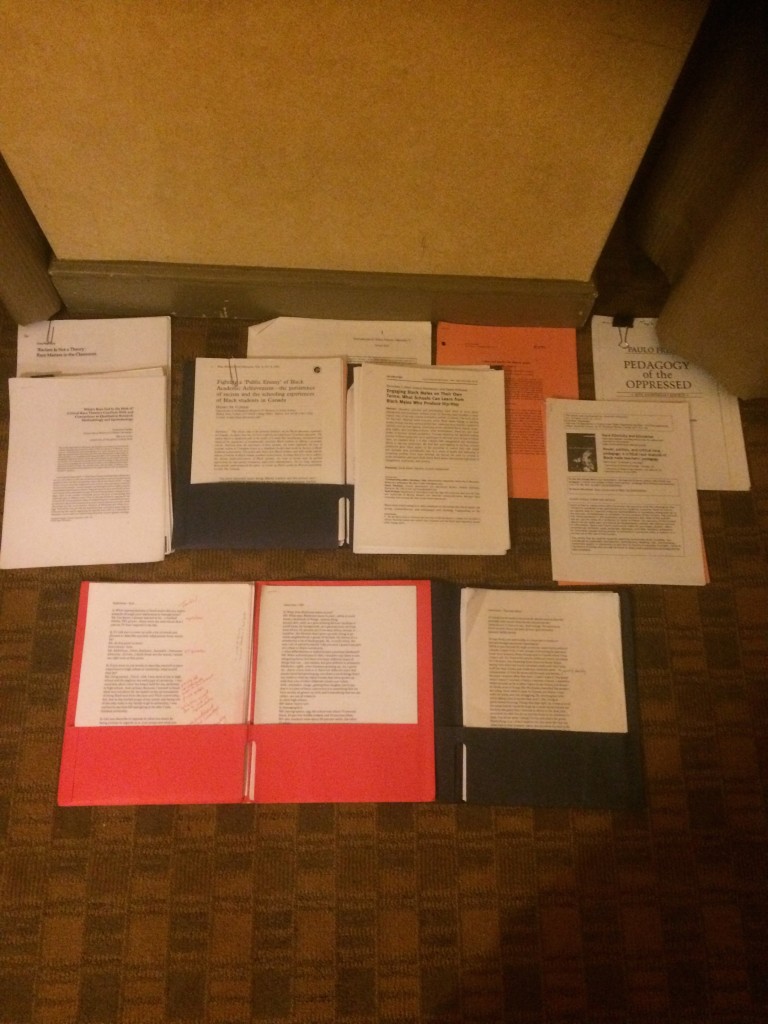It’s been a while since I wrote a blog, mainly because I am on the home stretch of completing a Thesis and I have tried to give it my full attention. Buried in articles, working through a paper that attempts to “utlize” forms of “phenomenological” analysis in order to “suture” a “rich description” that is based on “qualitative” studies gathered from participant interviews and coded using multiple theories will most definitely drain your battery; the one on your computer and the one in your head. On that note, let me catch my breath before I continue. Don’t worry, I am about to explain education’s ease.
While undergoing this Thesis project, I have indeed developed my understanding not only on education, but how knowledge itself is spread by discourse. Those countless journal articles I have read over the last few years equipped me with the tools needed to analyze an interview I have with a research participant and tie it into my work. Ironically, a recent language activity with my fifth graders revealed to me that elementary students are already doing this type of work unbeknownst to them. Without the training for how to analyze, I sat back listening to student responses to an activity on inferring and realized that elementary school is super-duper close to graduate school; and it is all in terms of how we naturally make meaning out of things. (I’m sorry; I couldn’t resist throwing in some super-duper easy-to-understand rhetoric. It’s been a while).
For this activity, we watched an animated short film titled, “Pigeon: Impossible”. The film is about a secret agent who faces a problem when a curious pigeon gets trapped in his government-issued nuclear briefcase. Important to the inference activity is that it has no dialogue. After we watched the film, we broke down the understanding of it. My students began to tell me the film would fall under the genre of a spy/espionage work due to the musical score that the creator chose to use, the wardrobe that the main character was attired in, and other visuals such as the font the creators chose to use at the beginning of the film. They elaborated on the pigeon’s personality and cited evidence referring to how they knew he was brave, greedy, and curious. They spoke about the agent’s emotions and how he was frustrated, determined and many other things. And they did all this with my simple question: “How do you know?”
I explained that when we infer, or comprehend, or analyze, or make understanding, we take “clues” from the text and combine them with our “schema” or background knowledge. Nothing complicated. That was my lesson on making inferences. Period over, recess time. I sat in my room alone slowly realizing that I’ve been doing the exact same thing through my qualitative study using phenomenological analysis. Only difference, I was doing it in grad school, them in elementary.
I guess I will make my inference on this experience now: children are born with tools required to make understanding out of things. This amazing gift that is bestowed upon us then gets built up through schooling. Unfortunately, it also gets dumbed down or disjointed by school at times (Pollack piece). The teacher’s second role, especially in the language arts, is to bring out this background knowledge of the world in a way that compliments a text, or in some cases, visa versa. Her primary role is to allow for that expression of opinion to be validated in the classroom. The only challenge then becomes using this background knowledge in an articulate way. That is exactly what my students did when they communicated to me their reasons for knowing certain details about a film with no words, which is the same thing I did when I coded and analyzed interviews and articles for my thesis. Basic stuff, we sometimes tend to forget how easy education can be.
[share title=”Share this Post” facebook=”true” twitter=”true” google_plus=”true”]

